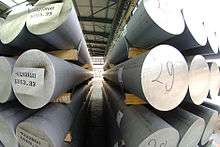Aluminium Bahrain
 | |
| Public | |
| Traded as |
LSE: ALBH BHSE: ALBH |
| Industry | Aluminium |
| Founded | 1968 (Operations began in 1971) |
| Headquarters | Askar, Bahrain |
Area served | Middle East , North Africa, Asia and Europe |
Key people | |
| Products | Standard ingots, rolling slabs, foundry alloy ingots, extrusion billets, T-Ingots, liquid metal, calcined coke |
| Revenue |
|
|
| |
Number of employees | 2,937 (2013) |
| Website |
www |
Aluminium Bahrain B.S.C., or simply Alba, is one of the largest industrial companies in the Middle East and is one of the top 10 largest aluminium producers in the world.[1] The company is based in Bahrain and 87% of its total workforce are Bahraini nationals.
The company produces a range of aluminium products, which include billets, liquid metal, standard ingots, rolling slab, propertzi and others. 50 per cent of Alba’s aluminium is sold to Bahrain’s downstream industry while the rest is exported to countries within the GCC, the Middle East, Europe, Far-East and South Asia.
In 2014, the company set an all time production record in its history with 931,427 metric tonnes.[2]
History
Alba was officially incorporated in 1968 and began operations in 1971 with an annual capacity of 120,000 metric tonnes per annum.[3] After modernisation and expansion works the smelter's capacity rose to 450,000 tonnes in 1992. In March 2005 Alba commissioned a new reduction line, Line 5, which increased the company's capacity to over 860,000 tonnes of aluminium. The maximum designed capacity of the smelter is around 1.2 million tonnes/year.
Ownership
The shareholders of Alba are Bahrain Mumtalakat Holding Company (69.38%),[4] SABIC Investment Company (20.62%) and the General Public (10%).
The company went public in 2010, launched its first IPO, and was listed on the Bahrain Bourse and the London Stock Exchange, under the symbol "ALBH".[5]
Plant
The Alba plant comprises five reduction lines, two cast houses, a dedicated carbon plant, a 550,000 mtpa coke calcining plant, a water desalination plant, 11 fume treatment plants, a marine terminal, and a 2,224 MW ISO power plant, consisting of 4 power stations. The plant also features a 10 hectare oasis, with more than 7,600 trees and shrubs, a fruit and vegetable garden, and an artificial lake.
Product Range



Aluminium Products
Standard Ingots
Standard ingots are ideal for downstream users who wish to re-melt this residual form of aluminium in their own furnaces, and then cast it to produce a variety of end products. Alba's production capacity of standard ingots stands at approximately 400,000 metric tonnes per annum.
Rolling Slabs
Sheet ingots, or rolling slabs, are used in rolling mills for manufacturing aluminium foil and sheet products. The total annual production capacity of rolling slabs currently stands at approximately 130,000 metric tonnes per annum.
Foundry Alloy Ingots
Foundry alloy ingots are mainly used by the automotive industry for manufacturing high quality automotive wheels, truck hubs and gas pump nozzles.
Extrusion Billets
Extrusion ingots are widely used in the construction industry (for windows and door frames), transportation, engineering, and consumer durables. Alba produces around 350,000 metric tonnes per annum of extrusion ingots.
Liquid Metal
The Liquid is supplied in liquid form to downstream industries in Bahrain and is transferred in crucibles. It takes 5 hours for the liquid metal to solidify.
Other Products
Calcined Coke
Alba is one of only two smelters in the world to have a dedicated coke calciner, its production capacity is nearly 550,000 metric tonnes per annum.
Anodes
Alba has three carbon plants that produce about 348,500 metric tonnes of anodes every year. Carbon anodes are produced from calcined petroleum coke and coal tar pitch.
Power
With its four power stations having a total power generating capacity of 2,224 MW ISO, equavilant to the average power consumed in Bahrain as a whole, Alba's energy needs are fulfilled independently.
Water
Alba’s seawater desalination plant was commissioned in 2001. It utilises waste heat from the calcining process to generate steam for the production and supply of 41,000 cubic metres per day of potable water.
Environment Conservation
Alba has invested more than US$589 million [6] environmental conservation and earned international praise and recognition for being committed to implementing highest environmental standards across the organisation.
In 1997, Alba was awarded the United Nations Environment Protection (UNEP) Award, and in 2000, the Millennium Business Award for Environmental Achievement. More recently, in 2005, Alba was the only plant in the region to earn the GCC Prize for the Best Industrial Establishment that complies with Environmental Standards and Specifications.[7]
Gallery
References
- ↑ "Top 10 Aluminum-Producing Companies in 2010". BLOOMBERG L.P. Retrieved March 15, 2011.
- ↑ "Alba sets all-time production record in 2014". Bahrain News Agency. Retrieved January 5, 2015.
- ↑ "Alba's Corporate Profile". Aluminium Bahrain. Retrieved August 24, 2010.
- ↑ http://www.bmhc.bh/en/cd/17/1/aluminium-bahrain-bsc-alba.aspx
- ↑ "Alba is given a welcome at the London Stock Exchange". Aluminium Bahrain. Retrieved February 8, 2012.
- ↑ "Safety, Health and Environment". Aluminium Bahrain. Retrieved February 9, 2012.
- ↑ "Alba's awards and achievements". Aluminium Bahrain. Retrieved February 9, 2012.









